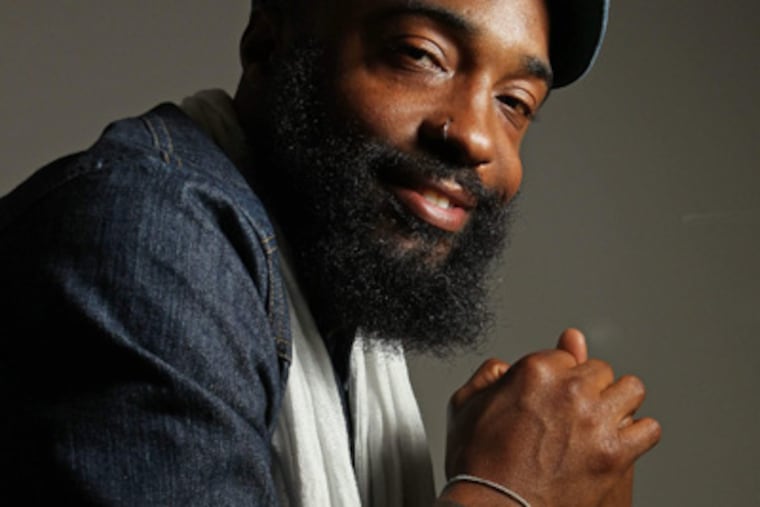Bradford Young at forefront as more black-themed movies find a market
Bradford Young, artist among filmmakers, is a cinematographer most comfortable behind the camera.

Bradford Young, artist among filmmakers, is a cinematographer most comfortable behind the camera. But the soft-spoken 34-year-old is enjoying his moment in front.
For two consecutive years, indie movies that he has lensed have won prizes at the Sundance Film Festival, including one for his work on the coming-of-age and coming-out drama Pariah. His stunning use of light has won him international admirers, including Nigerian director Andrew Dosunmu, with whom he worked on the African-in-Manhattan nocturne Restless City, which opens Friday. When Ava DuVernay's Middle of Nowhere debuts in October, it will be Young's third feature to hit U.S. screens in 10 months.
Young's sudden visibility is one sign that after a long eclipse, the work of African American filmmakers other than Tyler Perry and Lee Daniels is seeing the light of day. Another: The box-office success of Think Like a Man, which opened April 20, surpassed expectations and recouped its $12 million budget on its first day. From studios such as Screen Gems, which produced Think, to the grass-roots African-American Film Festival Releasing Movement (AFFRM), which is giving a boost to independent moviemakers, more black-themed films are finding their way into the marketplace this year than they have in 20 years.
According to a 2011 survey of moviegoers commissioned by the Motion Picture Association of America (MPAA), African Americans, 12 percent of the North American population, accounted for 12 percent of ticket sales. What's wrong with this picture? It's nearly a 50 percent drop from 1991, when the MPAA reported that African Americans, then as now 12 percent of the North American population, bought 23 percent of the tickets.
The year 1991, explains Mike Dennis of Philadelphia's Reelblack, was a watershed year when 19 features by African American directors were released, more than in the entire decade of the 1980s. "Things tend to run in cycles," says Dennis, whose organization and others like it in Atlanta, Chicago, and Washington are members of the AFFRM consortium promoting films, including two on which Young has worked. Dennis believes in the 20-year rule, whereby the younger generation takes the reins from the elder.
He observes that "1991 was 20 years after the blaxploitation wave began with Shaft. It's no coincidence that AFFRM emerged exactly 20 years after the last wave of New Black Cinema."
AFFRM, the brainchild of DuVernay, a mainstream publicist-turned-indie filmmaker, was founded in 2011 with the goal of distributing movies from black directors. When DuVernay, who had helped shape the campaigns for studio movies such as Dreamgirls and Invictus, traveled the black festival circuit with her documentary My Mic Sounds Nice chronicling the history of women in hip-hop, she recognized the vitality of the venues and the hunger of underserved audiences.
And when she began making her feature debut, I Will Follow, DuVernay says, "I knew that the story I wanted to make was not the story that studios want to sell."
So she helped "create a path for my film and others like it that tell complex, nuanced narratives with people of color," by connecting with "like-minded black film advocates, such as Reelblack in Philly," who promoted the films. Movie chains such as AMC, Laemmle, and Rave became AFFRM's exhibition partners.
In March 2011, I Will Follow became AFFRM's inaugural release, followed by Kinyarwanda, about the genocide in Rwanda, in November. Restless City is AFFRM's third theatrical release in 15 months.
"Pariah. Middle of Nowhere. Mississippi Damned. Restless City," DuVernay lists some of the films in what she calls BlackArtRising. "These are just a few titles, and Bradford happens to have shot all of them."
Born in Louisville, Ky., and raised in Chicago, Young is old enough to remember the Black Film Renaissance of the early 1990s, when "there was a willingness in Hollywood to engage with black audiences on subjects that weren't only biographies and movies that made us laugh." He was shaped by those films, and also by the plates in the art books on his grandparents' coffee table that were filled with the colorful canvases of Romare Bearden and Jacob Lawrence. He studied with Haile Gerima, the maker of Sankofa!, at Howard University.
Aside from Young's dramatic framing and balletic camera movement, he shoots skin so that it seems to glow from within. When he came to Philadelphia in April to advance Restless City, he met with students and joked with a photographer that he wanted to develop "Choco-chrome," a film stock designed to capture the spectrum of people of color.
Young is in demand because even when he shoots digitally, he successfully gets the nuances and textures of film.
"What's cool about his work is that you could freeze any frame from his movie and it would have the qualities of a fine art print," Dennis says. "But once you set the image in motion, you realize that it is in complete service of the greater whole."
"Ava is the first person I've met since Haile who gives me hope that you can control the way you shoot and distribute a film," Young says. "That you don't have to wait for the blessing of Hollywood or Indiewood."
According to DuVernay's tally, "There are more than two dozen black independent filmmakers, women and men in near equal numbers, currently making their first or second feature at this moment. Outside of the studio system. Unaffiliated. Independent. A renaissance in black cinema is unfolding right before our eyes. It's thrilling and it's happening now."
Contact Carrie Rickey at carriedrickey@phillynews.com. Follow her at http://www.carrierickey.com.
Film Restless City
Opens Friday at AMC Loews Cherry Hil